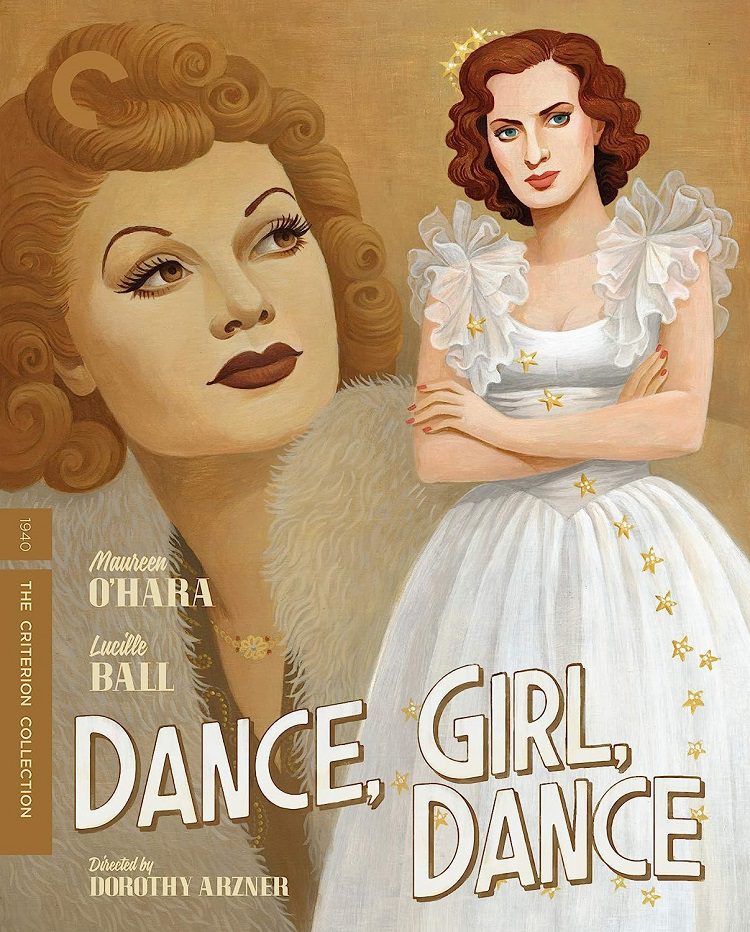
The iconic Dorothy Arzner was definitely an legend in the history of cinema. She was the only female director working in Hollywood during the “Golden Age”, from the 1920s to the early 1940s, where she retired in 1943. She subverted the expectations of how women were depicted in film. Most of her characters were independent women trying to forge their own lives, and careers, without the usual scornful male dominance. Despite her body of work, it was her 1940 landmark, Dance, Girl, Dance, that would confirm her place in film lore.
The film stars Maureen O’Hara and Lucille Ball as two good friends who are also both up-and-coming dancers. Judy (O’Hara) is a ballerina who struggles to succeed in her chosen profession while Bubbles (Ball) gets by on her looks and feisty personality. They find themselves on opposite sides, especially when it comes to a ladies’ man, played by Louis Hayward.
On the surface, it was seen at the time as a cliche-splattered, slightly campy melodrama about friendship, jealousy, ambition, and the high price of fame. However, after many decades and re-evaluation, it is now seen an unconventional cult classic of female empowerment. There is a pivotal moment where Judy, fed up with being Bubbles’ understudy (or ‘stooge’), stops and confronts the crowd (including the slobbering males) with this fiery, now-famous monologue: “Go ahead and stare.” “I know you want me to tear my clothes off so you can get your fifty cents worth. Fifty cents for the privilege of looking at a girl the way your wives won’t let you?…What’s it for? So you can go home when the show is over…and play the dominant sex for a minute. I’m sure your wives see right through you the same way we do.” It’s safe to say that this was a bold move on Arzner’s part, and now is seen as statement of how women should be treated, with respect and dignity, and not objects of ridicule. In 2007, it was selected by the Liberty of Congress to be included in their National Film Registry for being cultural and significant, and rightly so.
The new edition by Criterion isn’t jam-packed, but it does contain two new interviews that do sound enlightening: one with critic B. Ruby Rich, and the other with legendary filmmaker Francis Ford Coppola. There is also an essay by esteemed critic Shelia O’Malley.
I definitely recommend this film, as not only a worthwhile addition to any film lover’s collection, but also as a sheer wake-up call to signify the blazing importance of female filmmakers.
Other notable releases:
The Blues Brothers (4K): John Landis’ 1980 classic about Jake and Elwood Blues, two musical brothers who try to raise $5,000 for their childhood church by putting their band together. During their tour, they unwittingly wreak havoc on the entire city of Chicago and much of the Midwest.
Selena (Warner Archive): Jennifer Lopez gives a breakthrough performance as the late, great Selena Quintanilla Pérez, the Texas-born singer who rose from humble beginnings to becoming a legend of Latin music.
The Good Place (The Complete Series): The acclaimed comedy series with Kristen Bell as an ordinary woman who enters the afterlife, and thanks to a sudden error, is sent to the Good Place instead of the Bad Place, where she belongs. While hiding in the open from Michael (Ted Danson), the architect of the Good Place, she strives to leave her old way of life to discover the great person within.
Flashdance: Jennifer Beals stars in the 80’s blockbuster as Alex, a steel worker by day, exotic dancer by night. Her lifelong dream is to get into a real dance studio, and with the help of her boss/lover, she may get her chance.
Lonely Are the Brave: The late, great Kirk Douglas stars as a rebellious cowboy who arranges himself to be locked up in jail in order to help his old friend escape the penitentiary. Also starring Gena Rowlands and Walter Matthau.